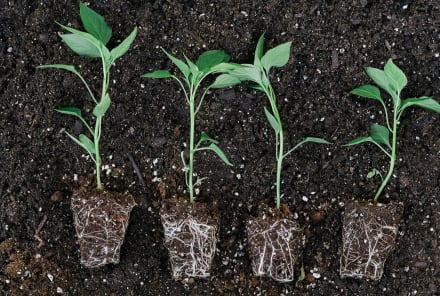Advertisement
One Day Isn't Enough: 6 Earth Day Resolutions To Set & Stick With

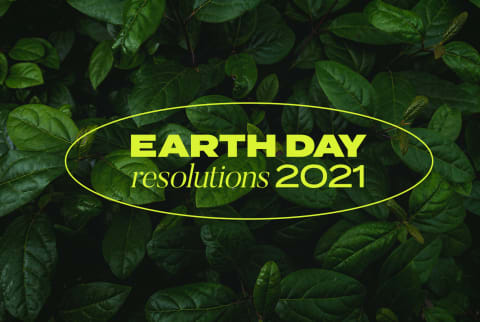
The climate crisis won't be solved in a day.
While Earth Day is certainly nice in theory, in practice it needs to last well beyond April 22. This is one holiday that could use the New Year's treatment: Imagine if we all used Earth Day to check in with ourselves and set ambitious eco-friendly goals for the future? Imagine if we shared them with friends and loved ones and vowed to keep each other accountable moving forward?
At mbg, we're all for individual commitments to exercise more or eat less sugar, but these sustainability resolutions would have a greater impact on our collective communities (and many of them would pay dividends for personal well-being, too).
So, in the name of reflecting on where we've been and charting a new path forward, today we're sharing six Earth Day 2021 resolutions inspired by the consumer trends that we've seen brewing in the past year. Pledge to one; pledge to them all; or pledge to your own. Whatever you do, take today to pledge to something.
I will create less waste at home.

If you've spent the majority of the pandemic at home, you probably have a newfound awareness of just how much stuff your household throws away. A lack of on-the-go and office tossing means all our trash is ending up in our personal trash and recycling bins.
Uncomfortable realizations about consumption habits have ensued: In one recent survey of 2,000 nationally representative Americans by water filter company Hydros, the majority of respondents said they've used unsustainable packaging like plastic bags more than they would have liked to during the pandemic. Another report from Republic Services, the second-largest recycling company in the U.S., confirms that there's been as much as a 63% increase in residential cardboard recycled in some locations, as well as substantial upticks in the number of plastic water bottles and single-use coffee cups recycled by households in their network. On the bright side, according to Hydros' survey, 69% of those polled reported that they have a plan for reducing their waste after the pandemic ends.
Commit to this resolution by auditing your trash: Take note of the things you're throwing away most often, and look for lower-waste alternatives within those categories. For anything left over, read up on your community's recycling rules, and look into whether there is an organic waste compost site near you. (If not, could you consider backyard composting?)
I will stick my hands in the dirt more.
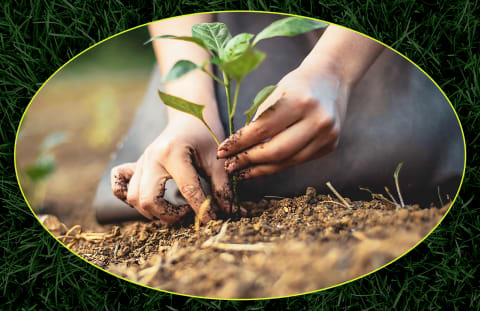
The backyard gardening industry has been growing for the last few years, but the pandemic really put it in bloom. The 2021 National Gardening Survey notes a surge in gardening interest across all age groups since COVID-19 began, driven by factors like more time, space, interest, and confidence to put toward plantings.
In addition to being good for mental1 and physical health, gardening can give you a renewed appreciation for your nearby nature and the cycles that it follows. And if you choose to grow your own food, it can also cut down on the carbon footprint of your diet.
Commit to this resolution by planting an indoor or outdoor herb garden, joining or starting a community garden, or upping your backyard setup with a sustainable method like lasagna gardening (not what it sounds like).
I will shop secondhand first.
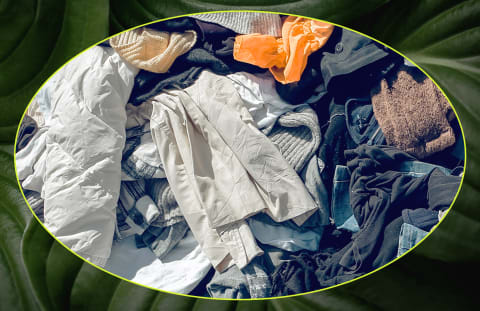
Our wardrobes changed in more ways than one this past year. In addition to loading up on sweats and athleisure, we also started shopping secondhand more than ever. ThredUp, a secondhand clothing retail platform that went public last month, reports that at the end of 2020, 1.24 million active buyers had made a purchase from their site within the previous 12 months—a 24% increase from 2019.
According to industry estimates, the resale market is expected to become a $36 billion industry by 2024, and 72% of retail executives surveyed in one report said they'd be interested in testing out a resale model in their stores to appeal to the increasingly environmentally conscious consumer. This push toward secondhand, which is better for the environment because it keeps clothing out of the landfill and reduces the demand for new, resource-intensive clothes, is especially strong among Gen-Z'ers. TikTok videos tagged with the "thrifting" hashtag have now amassed over 1.2 billion views.
Commit to this resolution by reading up on slow fashion and shopping from or selling with this list of online thrifters. And remember that clothing isn't the only category you can shop for secondhand: Here's a glimpse into the secondhand economy for home goods.
I will continue to be picky about my transportation.

Remember early on in the pandemic when global CO2 emissions suddenly dropped by 8.8%2? It was largely thanks to reductions in long-haul flights and car travel, which are now back up in many parts of the world. However, lingering trepidation about public transport and the rise of the virtual workforce has caused lots of people to more permanently re-imagine their transportation routines.
Case in point: Bicycle suppliers are still struggling to fill the great bike shortage of 2020, and data from Fitbit shows that though average daily step counts are down around the world, users have gotten more into running and hiking since the pandemic began (which explains why national parks trails have been so full). Hopefully, this new appreciation for alternative means of low-carbon transportation and exercise sticks around, even after international travel picks up again.
Commit to this resolution by pledging to walk, bike, or run instead of driving when you can and exploring your nearby nature instead of flying to exotic locales.
I will actively support a more intersectional environmental movement.
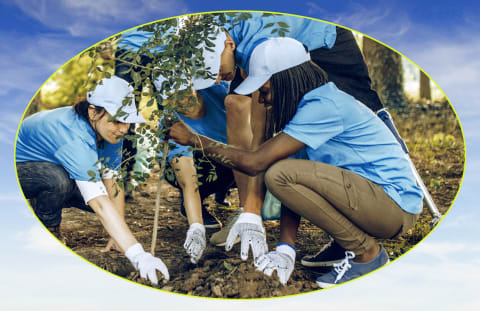
The Black Lives Matter and #StopAsianHate movements have underscored the need for anti-racism work across all facets of our society—including within the conservation movement, which has historically ignored people of color.
Last May, the environmental movement got a wake-up call when Leah Thomas posted an Environmentalists for Black Lives Matter tile on Instagram, which has since gone viral and reached over 1 million people. Thomas and her organization Intersectional Environmentalist have continued to ignite conversations on the need for greater inclusivity and cultural competence within the environmental movement and the importance of climate policies that benefit all, not just a select few.
Commit to this resolution by following and engaging with Intersectional Environmentalist, Outdoor Afro, GirlTrek, and other environmental groups serving BIPOC communities.
I will shop local & seek transparency.
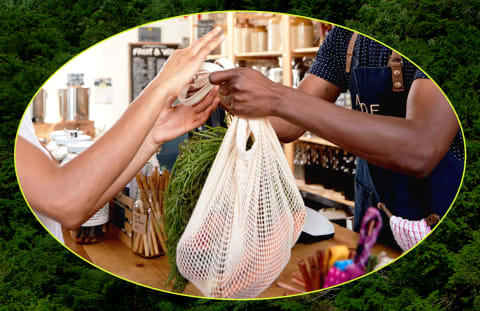
Supporting local businesses and the people behind them took on new importance during the throes of the pandemic. According to one survey on over 1,600 Americans over the summer, 82% of them said they would be willing to spend more money to support their local businesses. This winter, a similar-size survey by Mint found that consumers were increasingly focused on shopping small businesses for the holidays.
Those buying from larger companies also seem to be increasingly concerned with how their money was trickling down. Innova, a global market research company, has named increased supply-chain transparency a top concern for 2021, particularly for the food and beverage industry. Big players in food are responding with new labels that make it easier to identify products that were made with people and the environment in mind, like Whole Foods with their new Sourced For Good label and Thrive Market's new tool for shopping by your environmental and social values.
Commit to this resolution by looking to shop local first and support companies that are really putting in the work to support a healthier future for the planet and people.
Sarah Regan contributed reporting to this article.
